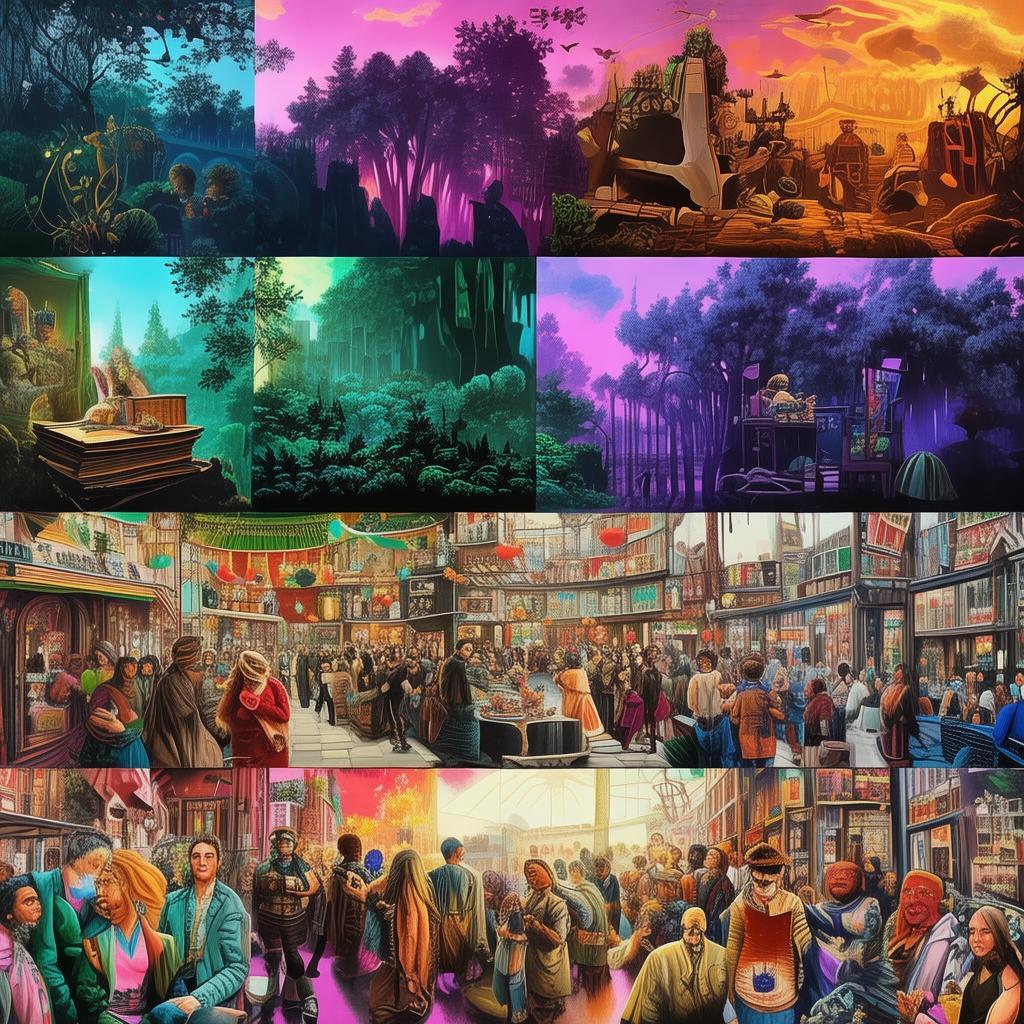The Buddha's Spider's Web: A Tale of Karma and Compassion
In the heart of a tranquil village nestled among rolling hills, there lived a young man named Ananda. His life was simple yet filled with the weight of tradition and the expectations of his family. His father, a revered elder in the village, was a follower of the Buddha's teachings, and Ananda was no exception. He spent his days tending to the family's fields, learning the ancient wisdom of the Dharma, and weaving intricate patterns into the walls of their home—a skill passed down through generations.
One evening, as the sun dipped below the horizon, casting a golden hue over the village, Ananda encountered a peculiar sight. A spider had spun a web that seemed to defy nature, its intricate design unlike any he had ever seen. The web was not just a series of threads but a tapestry of life, with each thread interwoven with another, creating a pattern that seemed to tell a story of its own.
Intrigued, Ananda approached the web, and as he did, a voice echoed in his mind, "This web is a metaphor for karma, the law of cause and effect. Each thread represents an action, and the pattern it creates shows the consequences that follow."
The voice was that of the Buddha himself, who had appeared to Ananda in the form of a wise old man. Ananda bowed deeply, seeking guidance.
"The Buddha's teachings say that compassion is the essence of our existence," the voice continued. "But compassion is not merely an emotion; it is the willingness to understand the interconnectedness of all beings. Look at the web, Ananda. Can you see the threads that bind you to your family, to your village, to the world?"
Ananda gazed at the web, feeling the weight of his life's choices pressing upon him. He had always been loyal to his family, but he had also been drawn to the teachings of the Buddha, which spoke of a path that was not bound by the constraints of tradition.

The next morning, Ananda's father called him to the village temple. "Ananda," he said, "our village needs a new leader. You must take up the mantle and guide us in our spiritual journey."
Ananda's heart sank. He knew that accepting this responsibility would mean living a life of service, but it would also mean staying in the village, away from the path of enlightenment he so desired. He looked at the spider's web, now shrouded in darkness, and felt the threads of his destiny pull him in different directions.
As he pondered his decision, the village was struck by a terrible drought. The crops withered, the rivers dried up, and the people turned to Ananda for answers. "We must pray to the gods," his father insisted. "We must perform rituals to bring the rain."
But Ananda knew that rituals would not suffice. He had learned from the Buddha that true compassion required understanding the root of suffering. He approached the people of the village and spoke to them of the interconnectedness of all life. "We must respect the earth," he said. "We must live in harmony with it, not in fear."
The villagers were skeptical. "Without the gods' favor, we will starve," they said. "We need you to lead us in the old ways."
Ananda knew he had to make a choice. He could continue to weave his life into the fabric of his family and village, or he could follow the path of the Buddha and seek enlightenment. He looked at the spider's web, now illuminated by the morning sun, and saw the threads that bound him to his past and the threads that beckoned him to his future.
In a moment of clarity, Ananda made his decision. "I will lead you," he said, "but not through rituals or prayers. I will teach you to live with compassion and respect for all life."
The villagers were hesitant at first, but as Ananda shared his knowledge and wisdom, they began to see the value of his teachings. They learned to plant drought-resistant crops, to conserve water, and to live in harmony with the natural world. Slowly, the rains returned, and the village flourished.
As the years passed, Ananda's teachings spread beyond the village, and he became known as a wise and compassionate leader. He never forgot the spider's web, the metaphor for karma and compassion that had guided him on his journey.
One day, as he stood before a crowd of followers, Ananda shared the story of the spider's web with them. "This web reminds us that our actions create a pattern in the fabric of the universe," he said. "We must choose our actions wisely, for they will determine our future."
As the crowd listened, they felt the weight of their own choices, the threads of their lives intertwined with the lives of others. In that moment, they understood that compassion was not just a feeling but a way of life, a path that led to peace and enlightenment.
And so, the story of Ananda and the Buddha's Spider's Web continued to be told, a tale of karma and compassion that would inspire generations to come.
✨ Original Statement ✨
All articles published on this website (including but not limited to text, images, videos, and other content) are original or authorized for reposting and are protected by relevant laws. Without the explicit written permission of this website, no individual or organization may copy, modify, repost, or use the content for commercial purposes.
If you need to quote or cooperate, please contact this site for authorization. We reserve the right to pursue legal responsibility for any unauthorized use.
Hereby declared.









